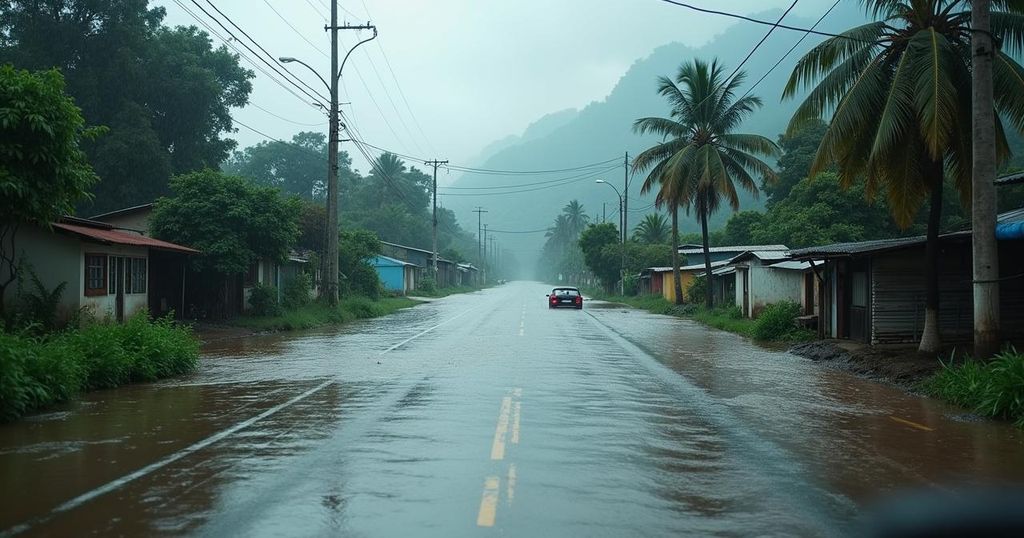Severe Flooding in West and Central Africa: A Humanitarian Crisis Unfolds
Severe flooding caused by torrential rains in West and Central Africa has displaced over 400,000 people, mainly in Nigeria’s Borno State. The floods have resulted in over 1,000 deaths and aggravated existing humanitarian crises across the region. Local authorities are overwhelmed as rescue efforts continue, with calls for international assistance growing. The situation reflects a growing vulnerability to climate change impacts in a region facing significant challenges from conflicts and inadequate infrastructure.
Severe flooding persists across West and Central Africa due to relentless torrential rains. In northeastern Nigeria, the effects are particularly devastating, with over 400,000 individuals affected according to the United Nations. Aerial imagery reveals massive displacement resulting from the floods, which have now claimed over a thousand lives across the region, exacerbating ongoing humanitarian crises in Nigeria, Chad, Mali, and Niger. In Maiduguri, Nigeria’s Borno State capital, the situation is dire. Reports describe entire houses being swept away and inmates fleeing a severely damaged prison as floodwaters surged from an inundated dam. The floods have resulted in a rising death toll: at least 230 people in Nigeria, 265 in Niger, 487 in Chad, and 55 in Mali have died. Such conditions represent the most severe flooding witnessed in the region in decades. While Africa contributes negligibly to global greenhouse gas emissions, it remains acutely susceptible to the impacts of climate change. According to the World Meteorological Organization, the cost of adapting to such extreme weather events in sub-Saharan Africa is estimated to range from $30 billion to $50 billion annually over the next decade, with projections indicating that up to 118 million Africans may be affected by extreme weather by 2030. The impact on Maiduguri is particularly hard-hitting; the city has already experienced continuous violence from Boko Haram militants in recent years, further complicating recovery efforts. Local resident Saleh Bukar recounted the panic that ensued as flooding began, stating, “Water is flooding everywhere!” as his neighbors shouted in alarm, warning them to evacuate. Tragically, some among the elderly and disabled were left behind and met with fatal consequences when they could not escape the rising water. Local authorities report that more than 600,000 individuals in Borno have been displaced, encompassing at least 100 fatalities and numerous injuries. The floodwaters have had devastating effects on local wildlife, infrastructure, and public services, with many key bridges and walls of crucial facilities consequently collapsing. In reaction to this crisis, Governor Babagana Zulum has urgently called for international assistance, stating, “Our resources are stretched to the limit, and we cannot do this alone.” Meanwhile, the World Food Program has initiated food distribution to those displaced, and USAID has provided over $3 million in humanitarian aid to affected areas. The flooding has also profoundly affected individual lives; Harira Adamou, a single mother from Niger, shared her despair as floodwaters destroyed her home, stating, “The rooms are destroyed; the walls fell down.” Adamou, unemployed and mourning the loss of her husband, now struggles to find adequate shelter for herself and her six children. As of now, 15% of Maiduguri remains inundated. Local authorities expect further rains, suggesting that additional flooding may occur. Bukar, now a volunteer aiding fellow flood victims, expresses his sadness for his community’s plight while emphasizing the necessity for collective assistance, asserting, “Our people need us. They need help.” In summary, the continued flooding in West and Central Africa represents both a humanitarian disaster and a significant challenge arising from climate change, revealing the urgent need for effective international intervention. Floodwaters continue to threaten lives and livelihoods in a region already beset by conflict and instability.
West and Central Africa is grappling with unprecedented flooding triggered by torrential rains, which have led to catastrophic consequences, particularly in Nigeria, Chad, Mali, and Niger. This crisis occurs against a backdrop of varying humanitarian emergencies, primarily stemming from conflicts and inadequate infrastructure, compounded by the realities of climate change. The impact is multifaceted, striking both human lives and the natural environment, thus necessitating urgent responses from local authorities as well as international aid organizations to mitigate suffering and foster recovery in this vulnerable region.
In conclusion, the flooding crisis in West and Central Africa highlights the interlinkages between climate change, humanitarian need, and regional instability. As communities struggle to rebuild amidst ongoing threats from nature and human conflict, there remains a critical need for international solidarity and support to alleviate immediate suffering while addressing longer-term resilience against such events. The harrowing stories of individuals affected underscore the human cost of this catastrophe and the pressing need for coordinated efforts to avert future disasters of similar magnitude.
Original Source: apnews.com




Post Comment